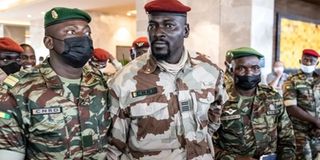Guinea names former opposition leader Mamadou Oury Bah as prime minister

Under international pressure, junta-leader Colonel Mamady Doumbouya (C) has promised to hand the reins of government back to elected civilians by the end of 2024.
What you need to know:
- Oury Bah's main task would be to defuse tensions with the 13 unions that called the strike that began Monday, which saw two people shot dead during sporadic clashes in Conakry's suburbs.
Guinea's ruling military junta said Tuesday that it had appointed a new prime minister eight days after dissolving the previous government, as the capital Conakry was paralysed on the second day of a general strike.
Protesters are demanding the release of a detained union leader as well as lower food prices, an end to media censorship and improved living conditions for civil servants.
The strike was called in a climate of growing social tension and in the absence of the transitional government after the junta announced its dissolution last week, without providing reasons.
In a televised address late Tuesday, a spokesman for junta leader General Mamady Doumbouya said "Mr Amadou Oury Bah, an economist, is named prime minister and head of government".
The spokesman said Oury Bah's main task would be to defuse tensions with the 13 unions that called the strike that began Monday, which saw two people shot dead during sporadic clashes in Conakry's suburbs.
Schools, shops, markets and roads in Conakry were again empty on Tuesday and hospitals offered only skeletal services.
Union spokesman Amadou Diallo told AFP that he was waiting for the "total and complete fulfilment of all demands" before ending the strike, adding that no meeting with the authorities had been planned for Tuesday.
The unions have made the release of Sekou Jamal Pendessa, secretary general of the Union of Press Professionals of Guinea (SPPG), a precondition for any negotiations with the ruling junta.
Pendessa was arrested at the end of January for "participating in an unauthorised protest" and was on Friday sentenced to six months in prison, three of which were suspended.
The group of lawyers defending him said in a statement that they had been informed on Monday that his appeal would be heard on Wednesday.
Protests became rare under junta leader Doumbouya, who took power in a September 2021 coup, and were banned in 2022.
The military has arrested several opposition leaders, civil society members and press representatives, while television channels have been removed and radio frequencies disrupted.
Under international pressure, the junta promised to hand the reins of government back to elected civilians by the end of 2024, but the opposition has accused it of authoritarian drift.





